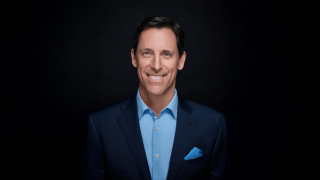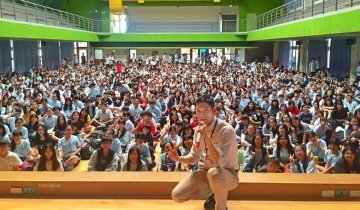When Regan Patrick EdD ’18 first enrolled in EDUC 523, “Challenges in Urban Education: Diversity,” a required course in USC Rossier’s Doctor of Education in Organizational Change and Leadership online program, he was immediately on the defensive. He remembers thinking, “Why do I have to do this?” and telling his wife he expected the class to be something akin to “Anti-White Man 101.” But the U.S. Air Force Lieutenant Colonel took a breath and remembered that classes like these were what he signed up for, and this course was “part of the ride.”
As the course kicked off, almost immediately, “things got uncomfortable,” Patrick recalls. He found himself getting offended by some of the assigned readings and how they were presented in class. He decided to take an approach that he describes as a “happy medium.” He started doing a lot of listening and asking a lot of questions.
However, no matter how many questions Patrick asked his professor, Associate Dean for Diversity and Community Engagement Darline Robles, she remained open and receptive to his inquiries. She took his concerns seriously and addressed them, while asking him questions about his perspectives as well. Robles allowed Patrick “to explore these critical topics in a non-threatening way,” he says.
Professor of Clinical Education Darline Robles recalls Patrick’s discomfort in the class, and also “fondly remembers the respectful way he would ask questions and challenge the research,” Robles says.
“It was almost like a therapy session,” Patrick says. “It was a fascinating education experience—one of my best. I learned a ton about myself, the topics and other people.” Patrick found himself a changed man. Robles “challenged me to see how important it is to understand and appreciate diversity in our world,” Patrick says, and he “experienced more revelations in Robles’ class than perhaps any other in his life.” The impact, he says, has been profound.
At the end of the course, Patrick sent Robles an email thanking her for the class and told her how it transformed his thinking. She then took the opportunity to invite him to speak to her summer class to share his experiences. “In the summer class, there were students who also had discomfort with the topics we would cover, and Patrick’s experience helped those students to become open to the content, discussion and how important it is to learn more about themselves and others,” Robles says.
Patrick soon found these types of conversations entering into his professional life. While on a long car ride with some of his work colleagues, the topic of Black Lives Matter and issues of diversity, equity and inclusion in the U.S. military came up. “It didn’t take long before I had each of them angrily shouting at me about how inclusivity and awareness were wrong, and how I was wrong and how the Air Force got it wrong,” Patrick says. In the tense “discussion-turned-argument,” Patrick found himself emulating his former professor and listening and asking questions. He never raised his voice, shouted or made any assertions.
“All I did was ask about their positions and thoughts, which quickly exposed their biases and showed how emotional this topic can be. Dr. Robles helped me understand that discussions on diversity issues require compassion, understanding and patience, all of which I attempted to use on this car ride,” Patrick recalls.
While Patrick might not have changed any minds on that car ride, the experience made him realize just how big an impact the OCL online program had on him.
After graduation, Patrick retired from the Air Force after 26 years of service and went on to work for a private company that provides education and global training solutions to armed forces around the world. The company, based out of Canada, works with militaries to help them “train people to do dangerous things in faraway places,” Patrick says. The goal for many of these military operations, Patrick explains, is not safety, but to get something done. During his time at the company, he found himself applying the methodologies he learned in the OCL online program to solve complex problems with incredibly high stakes.
Currently, Patrick is vice president and chief operations officer at Max Q Consultants, but no matter where his career path takes him, his time at USC remains a turning point.
The OCL online program, Patrick says “completely transformed how I thought of myself, my work, my industry and the whole field of education.” Patrick says he never thought of himself as a great student, and he enrolled in the OCL online program to “understand how to become a better leader. It completely changed the way I approach my profession.” These days, he’s not so reliant on his own opinion. Instead, he listens first and asks questions.
In the face of uncertainty for the future of diversity, equity and inclusion programs in the military, the private and public sectors, Patrick urges us all to be curious and not to be afraid of DEI initiatives.
“How do we move forward when we are so divided? It’s important for us to recognize and celebrate differences to achieve better outcomes. We all have biases and we have to understand that they are there in the first place,” he says. “Many often arrive at difficult discussions with a sense of already knowing the answers. Take the time to ask questions and think deeply before acting. This is an elegant skill for those in leadership. Ready, fire, aim is never a good idea.”





